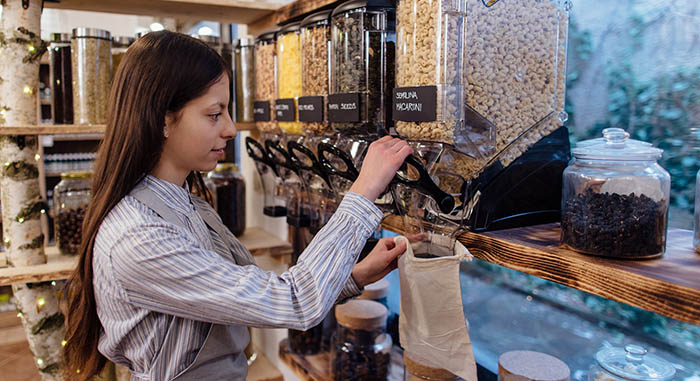Sustainability, according to the dictionary, is the ability to be maintained at a certain rate or level.
It is also, according to The World Commission on Environment and Development, “A process of change in which the exploitation of resources, the direction of investments, the orientation of technological development and institutional change are all in harmony and enhance both current and future potential to meet human needs and aspirations.”
Wow, is that a mouthful!
Basically, it means making sure we can sustain our resources to survive on this planet.
Whoa! Sorry, I didn’t mean to get so heavy.
But consumers are increasingly becoming invested in purchasing “sustainable” products, so it is an interesting topic to explore.
The Nielsen Company expects “sustainable-minded” U.S. shoppers to spend up to $150 billion on sustainable consumer packaged products by 2021.
In terms of food and beverage sales growth for the past year (year ended March 9, 2019), “sustainable” products have seen a large increase in sales:
- Products with nothing artificial (free from artificial colors/flavors/preservatives/sweeteners/hormones and antibiotics) increased 2.7%
- Clean label products (meets “no artificial” requirements) jumped 4.3%
- Simple <10 products (meets “clean” requirements and has fewer than 10 ingredients, all of which are recognizable) increased 1.3%
- Sustainable products (meets “simple” <10 requirements, plus has a sustainability claim) rose 3.7%
- Meanwhile, conventional product sales only rose 0.7%
Packaging also matters, and, according to Nielsen, products using these sustainable packaging methods are on the rise:
- Made from recycled packaging (with coffee, salty snacks, and pizza driving the growth)
- Post recycled (cookies and crackers, etc.)
- Recyclable (beverages sales are up)
Further, according to a Nielsen survey, 81% of respondents said that it is “extremely” or “very” important that companies implement programs to improve the environment.
In addition, 30% of respondents are willing to pay a premium for products that deliver on social responsibility claims.
So do you lean toward purchasing “sustainable” products? Let us know by leaving a comment.
Have a great and environmentally conscious weekend!
Best Regards,
Taylor



I believe it’s important to buy products which are sustainable because I, like many of my friends believe we are getting closer to the end of times. I am also very big on buying many products that are recyclable.
I prefer purchasing sustainable products, but not at the quality of the product or much higher prices. Some cleaning products I’ve purchased in the past, have been far below acceptable quality but yet the price was almost double. The quality needs to match the increase in price or I will not touch it. To help with this problem I’ve found myself going back to things my grandmother used to use and that is making my own cleaning supplies which mostly consist of baking soda and vinegar or lemon juice and some essential oils.
In order to teach the next generation, We have to lead by example!
I believe if we all do just one or two things to change how we shop, companies will have no choice but to implement sustainable practices.
I always try to purchase items that help our environment. I have grandchildren and we need to think about the next generation and what we are leaving them. What we do matters!
yes for instance sun chps spent almost 2mil$ to create a biodegradable bag good for the environment. But people complained that it was too loud of a bag (crinkling sound) and they stopped most production. Returning to non biodegradable bags so my family decided to boycott them. Hope this is the kind of feedback you are looking to find out from consumers.
As a member of the ’older generation’ nearly 80 years young, our mindset is not as strong as those who have grown up with it. While I truly believe we must take part in Sustainable and I practice it whenever possible, it is not always the first thing I think about when purchasing goods. However, I am making a conscious effort and soon the practice will be natural to me. Thanks
I try to do this.
Manufactures should just put everything in recyclable containers and the promote recycling to the Max.
I have been recycling for ten or more years. Residents in my community receive incentives for recycling.